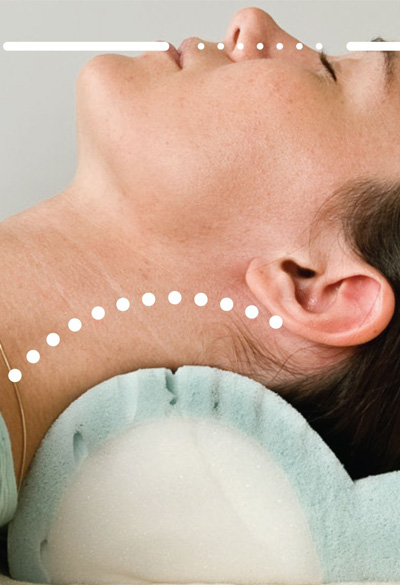No products in the cart.

What Is REM Sleep and Why Do I Need It?
The average human spends about 26 years of their life sleeping.
While you may not be aware of it, each night your body cycles through different stages of REM and non-REM sleep.
REM sleep is an important part of your natural sleep cycle, helping you to function at your best throughout the day. In fact, almost 7 years of your lifetimes will have been spent in REM sleep.
Read on to learn more about REM sleep and why it’s important.
What Is REM Sleep?
REM sleep, or Rapid Eye Movement sleep, is one of the four stages of sleep. The other three sleep stages are considered non-REM.
In addition to the rapid eye movement from which this stage of sleep takes its name, other signs of REM sleep are:
- Increased brain activity
- Rapid breathing
- Changes in body temperature
- Increased heart rate and blood pressure
- Sexual arousal
- Increased oxygen use in the brain
Many adults will experience atonia, or temporary paralysis of the arms and legs, during REM sleep. This is to protect you from acting out your dreams or sleepwalking.
You experience your deepest sleep and most vivid dreams during the REM sleep stage, at which point your brain activity is similar to that of your waking state.
Adults spend about 20-25% of their sleep cycle in REM sleep compared to the 50% typical of Infants.
You will typically enter the first stage of REM sleep about 90 minutes after you fall asleep, and it will typically last for about 10 minutes. The following REM stages gradually get longer, sometimes lasting up to an hour.
Why Is REM Sleep Important?
While only about 2 of the recommended 7 to 8 hours of sleep are spent in the REM stage, the negative impacts of missing this stage can be significant.
The REM stage of sleep is essential for processing knowledge and emotions, for making and retaining memories, and for exercising important neural connections in your brain.
Studies even suggest that sufficient REM sleep may guard against the symptoms of PTSD
REM sleep is particularly important for infants, who developed important brain functions during this stage of sleep.
Insufficient REM sleep has also been connected to migraines, reduced coping mechanisms, and difficulty managing a healthy weight.
How Can You Improve the Quality of Your Sleep?
If you wake up feeling groggy or have trouble remembering things from the day prior, you may not be getting enough REM sleep.
Here are some ways that you can improve your quality of sleep so that you wake up feeling rested and energized.
Stick to a Schedule
We have long known that getting at least 7 hours of sleep each night is necessary for our mental and physical health. However, going to bed and waking up at the same time each day is just as important in maintaining a healthy sleep routine.
In one study, irregular sleep patterns in adults increased the risk of chronic health problems like diabetes, hypertension, and heart disease.
Take Time to Wind Down
For the best quality sleep, schedule an hour of time to wind down before bed every evening. During this time, stay away from your computer, TV, smartphone, or tablet. The blue light that these devices emit can interfere with the body’s natural circadian rhythm and interfere with sleep.
Instead, try reading a book, drinking a cup of herbal tea, listening to some soothing music, or doing a sleep meditation. Turning off bright lights and making sure the temperature in the room is comfortable is another important part of a healthy wind-down routine.
Get Regular Exercise
Exercising plays a vital role in helping you to fall and stay asleep. Just 30 minutes of moderate aerobic exercise has helped patients with insomnia get a better quality of sleep.
However, it’s important to avoid exercise for a few hours before bedtime. Exercise raises your body’s core temperature and releases endorphins, both of which can interfere with sleep. Instead, try exercising in the morning or afternoon each day to receive the full benefit.
Avoid Alcohol and Caffeine
Alcohol acts on the body as a suppressant, which means that you may fall into a deep sleep faster after drinking. However, alcohol decreases the amount of REM sleep that you get, which can impact the quality of sleep.
Caffeine, on the other hand, can interrupt the circadian rhythm and make it difficult to fall asleep and stay asleep at night. For the best sleep, avoid caffeine and alcohol before bed.
Change Out Your Pillow
Anyone who has experienced back or neck pain knows that getting comfortable enough to fall and stay asleep can be incredibly challenging. Back and neck pain can result in tossing and turning throughout the night that interferes with REM sleep.
If you are someone who struggles with neck or back pain, perhaps the most important thing you can do for your sleep health is to swap out your pillow. A cervical pillow will properly support your neck, keeping your spine in alignment and helping you to sleep pain-free.
Get Your Best Sleep with a Cervical Pillow
Don’t let back or neck pain keep you from dreaming. With a cervical pillow, you can fall into restful sleep each and every night.
A PILLO1 pillow is proven to help you fall asleep faster, stay asleep longer, and get more REM sleep1
Check out our pillows and see how upgrading your pillow today can give you the shut-eye you’re yearning for.






